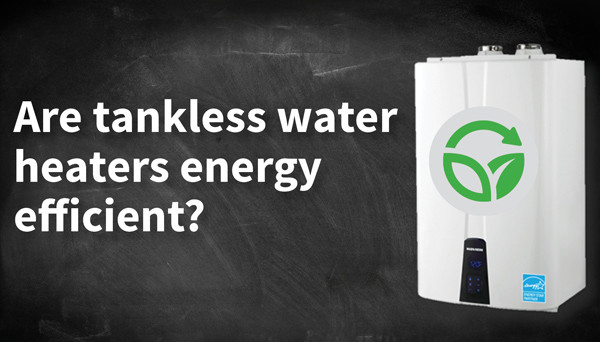Are tankless water heaters energy efficient? Yes, but to understand how it impacts you, lets first explore how energy efficiency is determined for water heaters. Energy efficiency in water heaters is measured as energy factor (EF). The EF indicates the water heater’s overall energy efficiency. This is determined by the amount of hot water produced by the water heater per unit of fuel consumed in a day. This measurement is based on the following factors:
- Recovery – how efficiently the heat from the energy source (gas or electricity) is transferred to the water.
- Standby loss – This only pertains to tank water heaters because water is stored in the tank. This is the percentage of heat loss from the stored tank compared to the heat content of the water.
- Cycling loss – This is the loss of heat as water circulates through the tank and the pipes.
Really only one of these apply to tankless efficiency since there is no recovery or standby loss. Cycling loss applies only to units that don’t keep the heat cycling throughout the unit. We explain these options further on down in this article.
Energy efficiency explained:
Standard water heaters have an energy factor of approximately .60. Meaning that approximately 60% of the energy generated is used to heat the water, and 40% of that heat is lost in this process. That heat goes out the vent. Tankless water heaters have a .80 – .99 energy factor. You will greatly reduce your heat loss when you convert to tankless, and use less fuel to heat the same volume of water.
FUEL TYPES
Gas Tankless Water Heaters
In most cases, especially in our area, we see mostly gas water heaters so you’ll likely be moving from a gas water heater to a gas tankless water heater. Gas tends to be about 23% more efficient than traditional water heaters.
Electric Tankless Water Heaters
Electrical units require a ton of amps to heat the water. In our area electrical tankless water heaters are not a cost effective option to be the main heating source for your water, especially when gas is available and much cheaper.
Overall, tankless water heaters are more energy efficient as indicated in the chart on the previous page. Once you eliminate the need to heat and store water your energy efficiency is going to go up and ideally your energy costs may go down, because you’re using less fuel to heat your domestic water.
Reducing your carbon footprint
One of the many reasons people choose to replace their standard water heater with a tankless is because tankless is an environmentally friendly way to heat your water. You will maximize the heat generated to provide hot water with little heat loss. Also, if you can use the same amount of hot water you were using when you had a standard water heater you will reduce your energy usage as well.

